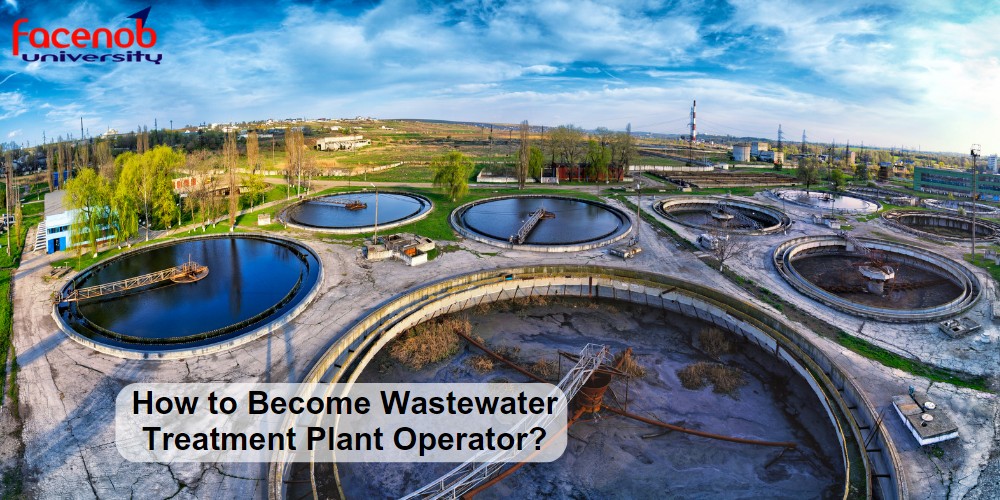How to Become a Wastewater Treatment Plant Operator?

Introduction of Wastewater Treatment Plant Operator
Is there enough water to go around if water is the new currency? Operators of wastewater treatment plants believe anything entering a sewer is not rubbish. They oversee a network of equipment that cleans stormwater and piped wastewater from homes and businesses.
Similar Job Titles
- Water Reclamation Facility Operator
- Wastewater Operations Specialist
- Water Resource Recovery Specialist
- Environmental Support Specialist
- Water Recycling Specialist Clean
- Water Specialist Water Utility Manager

Typical Job Responsibilities
What do Wastewater Treatment Plant Operators do?
A Wastewater Treatment Plant Operator would typically need to:
- Receive piped wastewater and stormwater from houses and businesses and add chemicals, such as ammonia or chlorine, to disinfect and deodorize the water or other liquids
- Inspect equipment, chemicals, and materials regularly to monitor operating conditions, meters, and gauges
- Collect and test the water and sewage colourples using test equipment and color analysis samples
- Record meter and gauge readings as well as operational data to document and report test results to regulatory agencies
- Operate equipment to purify and clarify water or to process or dispose of sewage
- Clean and maintain equipment, tanks, filter beds, and other work areas
- Operate and maintain power-generating equipment that provides steam and electricity to the plant
- Coordinate more complex repair work with engineers
- Monitor stock levels of chemicals and reorder them when necessary
- Follow the Environmental Protection Agency (EPA) regulations while ensuring safety standards are met by regularly assessing risks and hazardous conditions.ions
- Rely on computerized systems to help monitor the process in large plants but operate the equipment manually if there is a plant malfunction due to power outages or electrical is. sues
- Return water in a safe form to streams, rivers, and seas or use it for irrigation while disposing of residual sl.judge
Standard Work Environment
Many wastewater treatment plants are located near large towns and cities, although some are relatively far away. Wastewater Treatment Plant Operators operate outside in all weather conditions. Working circumstances may be smelly and moist, with exposure to unpleasant substances. They must always wear protective clothing.
Work Schedule
Typically, plant operators work 37 hours a week. Part-time employment is uncommon. Because water and wastewater treatment plants are open 24 houlabourday, seven days a week, shift labor is frequently required.
mustd to participate in a call-out cycle that includes nights and weekends. Operators work overtime, weekends, and holiays, and are on call of an emergency, such as severe weather or equipment malfunction.
Employers
Plant for Wastewater Treatment Operators may workare small, medium, or factorieshuge. Direct application to employers is an effective strategy for job seeking. Search for employment openings in classified ads in newspapers and on internet job sites.
Wastewater Treatment Plant Operators are generally employed by:
- Local Governments
- Water Utilities
- Sewage Works
- Other Systems Utilities
Unions / Professional Organizations
Professional groups and organizations are essential for Wastewater Treatment Plant Operators who want to advance their careers or interact with other professionals in their industry or sector. Participation in one or more of these organizations looks great on your resume and helps to strengthen your credentials and qualifications as a Wastewater Treatment Plant Operator.
Workplace Challenges
- Need for extensive training
- Malfunctioning equipment
- Tasks carried out in confined spaces or at heights need the use of compressed air breathing apparatus
- Slippery walkways and the presence of dangerous gases lead to a high rate of occupational injury and illness
Suggested Work Experience
Apprenticeships and advanced apprenticeships provide employers with paid structured training. Your salary will be determined by the industry, your age, your location, and the stage at which you joined the project.
Because operators need additional skills before working without supervision, larger treatment plants typically mix on-the-job training with formal classroom or self-paced study programs. Those having relevant work experiences, such as site maintenance or machinery operation, may be excluded from the training.
In several countries, people between 14 and 16 may pursue apprenticeships. Others require long-term on-the-job training to become fully competent Wastewater Treatment Plant and System Operators. Trainees typically begin as attendants or operators-in-training, learning their trade under the supervision of an experienced operator.
Recommended Qualifications
Certain companies may demand a high school certificate with competency in mathematics, English, a science or technology topic, and relevant skills and interests in nations without statutory minimum entrance requirements.
Certain employers may prefer a certificate or an associate degree in Wastewater Treatment technology from community colleges, technical institutions, or trade associations to reduce the required training.
A diploma in engineering, environmental studies, or land-based studies may also be useful. Some employers require a minimum admission age of 18, while others train young individuals aged 16 to 18. Some companies may require new operators to undergo a medical examination. Registration, Licenses, and Certification Individual government agencies oversee licensing. It usually entails passing an examination and an interview and meeting eligibility conditions such as a certain degree of education, work experience, training, or completion of an internship, residence, or apprenticeship.
Wastewater Treatment Plant Operators may be required by the state where they work in some nations. Levels of state licenses may exist to represent the operator’s expertise and training and to promote career advancement.
Certifications, Licenses, and Registration
Individual government agencies are in charge of licensing. It usually entails passing an examination and an interview and meeting eligibility conditions such as a certain degree of education, work experience, training, or completion of an internship, residence, or apprenticeship.
Wastewater Treatment Plant Operators may be required by the state where they work in some nations. Levels of state licenses may exist to represent the operator’s expertise and training and to promote career advancement.
Projected Career Map
Operators with the highest license level operate as Shift Supervisors in larger plants and may be in charge of large teams of Wastewater Treatment Plant Operators.
Job Prospects
Because some labour is physically difficult and unpleasant, the number of candidates for these occupations is typically low. Those with experience or education in water or wastewater systems and outstanding mechanical skills have the highest job possibilities.
Beneficial Professional Development
Wastewater Treatment Plant Operators can hold a variety of licenses. With each license level rise, the operator can handle a larger plant and more difficult processes without supervision.
Conclusion of Wastewater Treatment Plant Operator
Nobody ever got anything worthwhile without putting up some effort. Wastewater treatment is not for the faint of heart. Superheroes in dungarees are Wastewater Treatment Plant Operators.
Advice from the Wise
Listen closely to your plant’s seasoned operators and newcomers. Everyone must always do things the same way! It can be discussed if you still believe you have a superior concept after a few months. Always wear personal protective equipment (PPE). Pay close attention to maintenance and valving. Make use of all of your senses.
Explore Also: How to Become a Petroleum Geologist?
